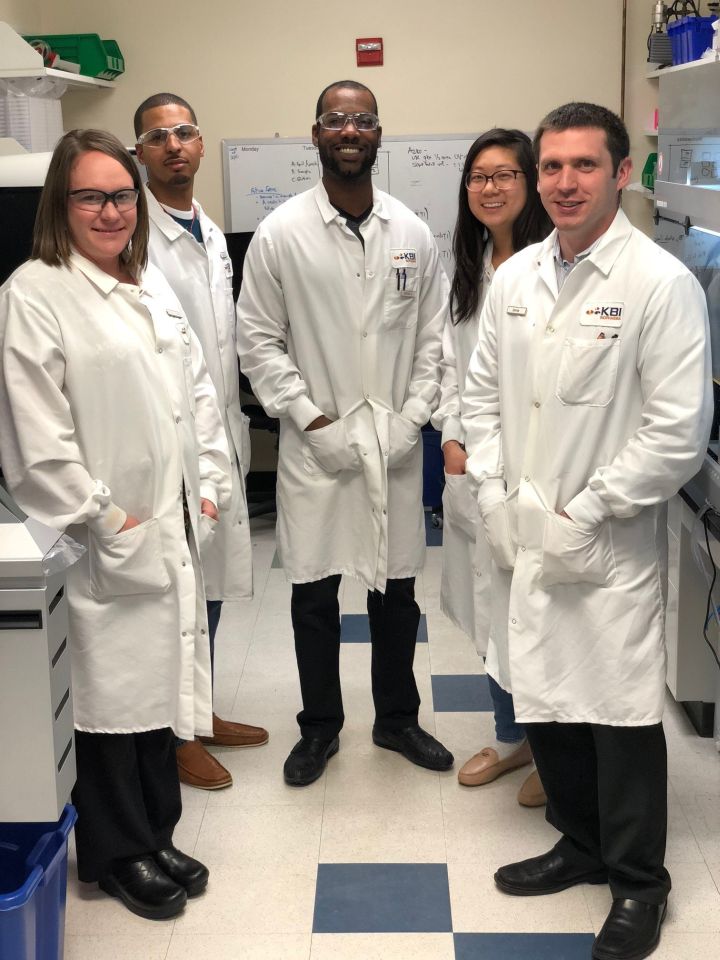Keywords:
Biopharmaceutical production is a complex process compared to small molecule drug manufacture, requiring the interaction of multiple biosynthesis pathways to create the target product. KBI Biopharma is using high throughput bioanalysis to gain an in-depth understanding of these biological processes, ensuring efficient, reproducible and scalable biomanufacturing processes.
Biopharmaceutical production requires a wide range of studies – including immunoassays, enzymatic assays, residual DNA detection and chromatography – to fully understand and optimize the biomanufacturing process. Many of these analytical activities are both time consuming and complex, leading many biopharmaceutical manufacturing facilities to use automated or semiautomated workflows. This not only helps to increase throughput and improve consistency, it also frees up technicians to perform tasks that are less automation friendly or to analyze results.
KBI Biopharma is a contract development and manufacturing organization headquartered in Durham, North Carolina, and works with a wide range of clients – from biotech start-ups to big pharma – to accelerate and optimize their drug development. The company’s highly successful biological manufacturing programs rely on using advanced analytical techniques to acquire in-depth knowledge of each biosynthesis pathway, resulting in more robust and scalable processes.
This data-driven approach requires large numbers of samples to be tested for each new project, and the company’s analytical development team recently began investing in automated liquid handling solutions to enhance its high throughput testing capabilities. Devon Davenport, Scientist I, explained: “When I arrived at KBI in 2014, there was no automation in use for our ‘platform’ assays; everything was performed manually. Coming from a high throughput automation background, I could immediately see the benefits of moving some of our high volume residual assays to an automated platform, and started to explore the options available. My manager, Alan, and I each already had some experience with Tecan platforms from previous roles and so, in July 2016, KBI purchased a Freedom EVO® 200 to automate our HCP ELISAs. This one assay was occupying four members of staff full time, and our intention was to offload all of this work onto the automated platform, allowing the analysts to perform other activities.”

Members of the analytical development team (left to right): Kirsten Dysinger, Elijah Gaspard, Devon Davenport, Phoebe Lee and Derek Ryan
“We began by setting up a ‘single plate’ assay protocol on the Freedom EVO – effectively taking the place of one analyst – which we were able to achieve and validate within six weeks of installation. This automated version of the assay offered at least comparable performance to our manual assay, and took the same amount of time to run – 3.5 hours. We then looked at how to use the instrument’s worktable capacity and scheduling capabilities to save time by processing multiple assay plates in parallel, something that would be virtually impossible for a single analyst to achieve manually.”
"The systems’ Freedom EVOware Plus has been great to work with; it’s very user friendly and intuitive."
Devon continued: “The first step for any parallel assay is to work out the on-deck capacity of every element required to run the assay – including hardware modules, assay plates, labware, consumables and reagents – then back-calculate the maximum throughput based on the limiting factor. For the HCP assay, the volume of the reagent trough determined that we could run eight plates without the need for user intervention, but there were only six assay positions on the worktable. We therefore built a script around parallel processing of six assay plates. This protocol took just under five hours to run all six plates – a huge time saving – but still resulted in instrument ‘idle time’ and unused reagent capacity, and so we ‘looped’ two additional assay plates onto the end of the protocol by exchanging the completed plates with two fresh ones from the instrument’s labware hotel. As a result, we can now process eight complete assay plates in 9 hours and 37 minutes without the need for user intervention, compared to 28 hours of hands-on analyst time. We have since applied this same approach to a number of other HCP ELISA protocols – each designed to meet individual clients’ specifications – with similar results.”
“Following the success of the HCP project, we have now also begun automating our residual DNA platform method using a Freedom EVO 100, based on the positive experience we’d had with the HCP platform and the ease of scripting within the software. The systems’ Freedom EVOware® Plus has been great to work with; it’s very user friendly and intuitive, and offers advanced users the ability to change and modify far more parameters than most other laboratory automation software I’ve worked with. This allows you to edit, for example, the exact timings and durations of individual pipetting steps or labware movements, which proved critical to achieving an optimized six-plate HCP assay. Building on this, we have now created modular automation ‘nodes’ which we can link together to form a complete protocol using the different, client-specific HCP assays running in parallel. The local Tecan team – who happen to be just up the road – have been great to work with, and have been extremely supportive as I’ve tried to get the most out of the system. Introducing the Tecan platforms has been so successful that we’re considering an additional Freedom EVO 200 to provide extra capacity and allow more assay development,” Devon concluded.
To find out more about Tecan’s Freedom EVO platform, visit www.tecan.com/freedomevo
To learn more about KBI Biopharma, go to www.kbibiopharma.com
Keywords:









